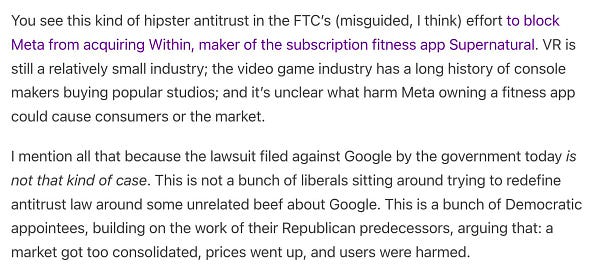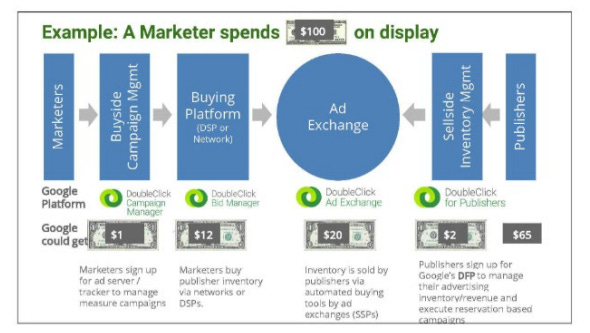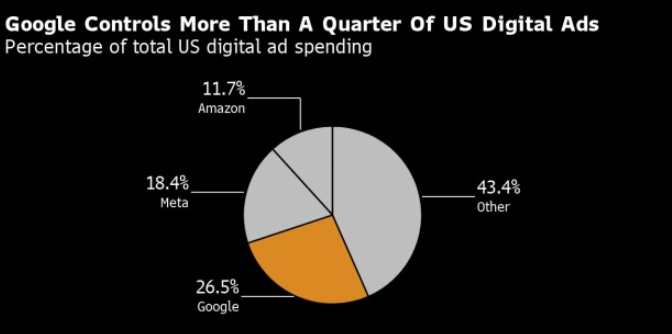Google's Antitrust Case Highlights A Chronic lack of A.I. Regulation and Rule of Law
The DOJ vs. Google isn't enlightening, it's frightening.
Hey Everyone,
In a U.S. internet without proper antitrust regulation, regulating A.I. is impossible. There’s no post-modern assurance that we are creating a safe and fair experience for everyone.
Google’s hold on Search Advertising, when the entire first page now can be Ads, is not reassuring. This week, the U.S. Justice Department filed its second antitrust lawsuit against Google in just over two years, this time targeting its advertising business.
Meta, Microsoft, Amazon and Google in reality are all due for antitrust regulation, but things move slowly in the United States, where monopoly Capitalism rules. So why does antitrust matter?


The Problem of Toxic Advertisers on A.I. Regulation
At a time when A.I. luminaries are saying ChatGPT is not especially innovative, while young coders abandon Google search for ChatGPT, things are starting to get interesting. If the U.S. lags in basic anti-monopoly regulation, how can it be a leader in A.I regulation? It seems as if 2023 is poised to be a big year for antitrust legislation, as governments around the world attempt to rein in the influence of the so-called “big five” tech giants — Alphabet, Amazon, Apple, Meta, and Microsoft.
From Europe to India, to China and the U.S. more is happening than before. Even TikTok that is the world’s leading consumer A.I. “entertainment” app has a greater chance of being banned in the 2023 to 2026 period than ever before, I’d give it a 50% chance of happening.
Google’s dominance in Ads has been toxic for many years and the recent Biden Administration action deserves some attention. It’s the first Google lawsuit filed under the Biden administration and seeks to break up Google’s online advertising business.
The lack of proper regulation in advertising and anti-competitive ecosystems and walled gardens in the U.S., means A.I. regulation has nearly zero chance of occuring in that country or on the Western internet.
Even on Substack few people care to cover the monopolistic tendencies of BigTech, perhaps Matt Stollar is best known for this:


Limited ‘Rule of Law’ in the United States
The problem is BigTech lobbying and high-powered lawyers and rather limited attempts by the DOJ to break them up means it’s mostly a minor side show. The politics in the matter and Silicon Valley interference is abysmal for rule of law to be taking place. DOJ Antitrust Division chief Jonathan Kanter had been cleared to work on Google matters. The legislative system around fighting monopolistic practices in the digital realm seems to have been purposely neglected in recent decades.
What results is a world where the only ones who can disrupt Google in advertising, are the other mighty monopolies: Amazon, Apple, Microsoft and so forth. For A.I. adoption and regulation this is very dangerous since the internet is ruled by Cloud and advertising factions who win the majority of the $Billions of revenue, the true spoils that the internet’s business models are based upon.
The U.S. government is (pretending) not backing down from cases against tech companies even in light of a mixed record in court (Bloomberg) on antitrust suits. The Duopoly, Google and Facebook, have for years dominated digital Ads and have not been good custodians to this tremendous power or even good A.I. innovators.
“The lawsuit we have filed today seeks to hold Google to account for what we allege are its longstanding monopolies in digital advertising technologies that content creators use to sell ads and advertisers use to buy ads on the open Internet,” said the Justice Department’s antitrust chief Jonathan Kanter in a news conference Tuesday announcing the suit. - Tuesday, January 24th, 2023.
Neither is it clear why the U.S.’s woeful attempts at antitrust regulation always come a decade or two too late? The same is happening in A.I. regulations and the consequences may be dystopian for our descendents and human rights online in general. All is fair in war and business and in America, it’s not a rule of law sort of world.
The EU, India and Germany are slowly cracking down on American BigTech. The Competition Commission of India ruled in October that Google exploited its dominant position in Android and told it to remove restrictions on device makers. There are so many potential cases to be made against Silicon Valley’s elite (and corrupt) monopolies.
Microsoft’s recent deal with OpenAI, is yet another case in point that raises major red flags. Countries that want a fair environment for their own companies to grow up will eventually have to block these American giants, and that’s unfortunately the world in which we are heading. India was among the first to block TikTok’s app.
We like to point the finger at TikTok, but Facebook, Google and now again Microsoft cripple our system of innovation by providing no actual means for fair competition in multiple domains. Silicon Valley is not aging particularly well in A.I. or business models outside the firm clutches of digital Ads and Cloud computing. Now with Amazon, ByteDance, Apple and Microsoft making significant headway in advertising in the 2022 to 2025 period, the door is slamming shut for serious A.I. regulation to occur.
Keep reading with a 7-day free trial
Subscribe to AI Supremacy to keep reading this post and get 7 days of free access to the full post archives.






